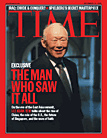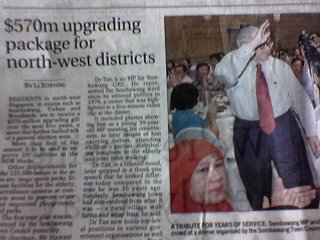It was from then Senior Minister Lee Kuan Yew's interview with William Safire that we learn that a Speakers' Corner was being planned for Singaporeans.
It was from then Prime Minister Goh Chok Tong's interview with Time that we learn that our civil service employ gays.
It was from Minister Mentor Lee's interview in Discovery Channel's 'History of Singapore' that we learn that he still gets emotional over Singapore's separation from Malaysia.
Now, thanks to a five-hour interview that Mr Lee granted to Time, we now learn that Singapore's founding father would have agreed to allow 'Singapore Rebel' to be shown if it was left up to him.
And so those who make the claim that Mr Lee pulls every string in the Government will be disappointed to learn that his views carries little weight over the decision-making process in the Media Development Authority, which had banned 'Singapore Rebel' and subsequently lodged a police report against the film-maker Martyn See.
Let's hope the Minister Mentor will grant Straits Times a five-hour interview soon so that Singaporeans won't have to buy a Western magazine like Time to read about their leaders' views on policies which will ultimately affect them.

The Time interview Part l
The Time interview Part ll
(click on the links above)
TIME: But you would concede that Singapore now needs more contention and turmoil?
LEE: Surely, surely. Ideally we should have Team A, Team B, equally balanced, so that we can have a swap and the system will run. We have not been able to do this in Singapore because our population is only 4 million, and the people at the top, with proven track records - not just in ability, but in character, determination, commitment - will not be more than 2,000. You can put their biodata in a thumbdrive.
We also have a different culture, a different way of doing things. The individual is not the building block. It's the family, the extended family, the clan and the state. The five crucial relationships are: you and the prince or the ruler, you and your wife, you and your children, you and your parents, you and your friends. If those relationships are right, everything will work out well in society.
TIME: A documentary film was made locally about a Singapore opposition politician, and it was banned.
LEE: Well, if you had asked me, I would have said, to hell with it. But the censor, the enforcer, he will continue until he is told the law has changed. And it will change ...
[But] I'm not guided by what Human Rights Watch says. I am not interested in ratings by Freedom House or whatever. At the end of the day, is Singapore society better or worse off? That's the test. What are the indicators of a well-governed society? Look at the humanities index in last week's Economist, we're right on top. You look at the savings index, World Bank, we're right on top. Economic freedoms, we're on top. What is it we lack? Reporters Without Borders put Malaysia's newspapers ahead of us. In Malaysia the ruling coalition parties own the major newspapers. In Singapore the major banks are in control of the company that runs our newspapers. There is no information that Singaporeans want that they cannot get. All major foreign newspapers and magazines are sold here. We demand a right of reply, that's all. And if you go over the line, if you defame us, we're prepared to sue you, go into the witness box and be cross-examined. You can brief the best lawyers and demolish us. If I'm involved, I go to the witness box. And you can question me, not only on the particular defamatory issue, but all issues in my life.
TIME: Couldn't you have been lighter on the opposition - not sue?
LEE: No. If you don't sue, repetition of the lie [makes it credible]. It will be believed ... (Former U.S. Secretary of State) George Shultz once wrote to me about why I insist on this right of reply. I said to him, "We believe in the marketplace of ideas. Let the ideas contend, and the best ideas the public will buy." But I also said, "That assumes a large well-educated group of people as readers. Look at the marketplace of ideas in the Philippines, and see the chaos." Americans can have a marketplace of ideas. For example, Michael Moore's Fahrenheit 9/11 was a box-office hit. Americans enjoyed their President being mocked and satirized. But the majority voted for Bush in November 2004. When we have a large enough educated population like America, able to make independent judgments, we will loosen up. But even without the cacophony, all ideas are accessible in the media and the Internet.
TIME: You have strong views about a political culture of noise and discordancy. Yet at the same time you want Singapore to move a little bit more in that direction.
LEE: Surely. It is in the interests of my son and his team to encourage Singaporeans to be more self-reliant, willing to take charge of their lives, and less dependent on looking to the government for solutions. In other words, become more like Americans. Gradually over the years, I have seen the value of the American can-do spirit.
TIME: Singapore is a more modern, more sophisticated, better educated society than the U.K. Young Singaporeans are bright, smart, lively. They can take it, they can take a noisy marketplace of ideas.
LEE: Look, I don't meet them so often now. My son does. Let him decide. It's his call.
